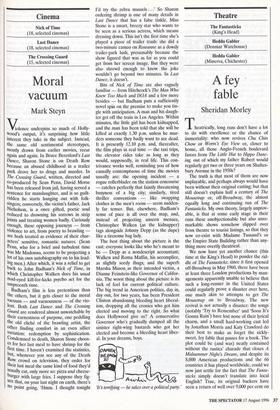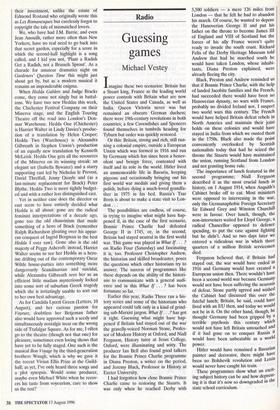Theatre
The Fantasticks (King's Head) Hedda Gabler
(Donmar Warehouse)
Hedda Gabler (Minerva, Chichester)
A fey fable
Sheridan Morley
Theatrically, long runs don't have a lot to do with excellence or the chance of immortality: who now revives Chu Chin Chow or Worm's Eye View or, closer to home, all those Anglo-French boulevard farces from The Little Hut to Hippo Danc- ing, out of which my father Robert would regularly get two or three years on Shaftes- bury Avenue in the 1950s?
The truth is that most of them are now unplayable, and perhaps always would have been without their original casting; but that still doesn't explain half a century of The Mousetrap or, off-Broadway, the almost equally long and continuing run of The Fantasticks. My own theory, largely unprov- able, is that at some early stage in their runs these unobjectionable but also unre- markable shows somehow slipped over from theatre to tourist listings, so that they now co-exist with Madame Tussaud's or the Empire State Building rather than any- thing more overtly theatrical. We now have yet another chance (this time at the King's Head) to ponder the rid- dle of The Fantasticks; since it first opened off-Broadway in May 1960, there have been at least three London productions by man- agements apparently unable to believe that such a long-runner in the United States could regularly prove a disaster over here, one much akin to attempts to get The Mousetrap on to Broadway. The new revival is not actually a disaster: the songs (notably 'Try to Remember' and 'Soon It's Gonna Rain') have lost none of their lyrical charm, and a small hard-working cast led by Jonathan Morris and Katy Crawford do their best to make us forget the sickly- sweet, fey fable that passes for a book. The plot could be (and was) neatly contained without the rustics' charade that closes A Midsummer Night's Dream, and despite its 8,000 American productions and the 66 countries it has played worldwide, could we now just settle for the fact that The Fanta- sticks simply doesn't translate into local English? True, its original backers have seen a return of well over 9,000 per cent on their investment, unlike the estate of Edmond Rostand who originally wrote this as Les Romanesques but carelessly forgot to copyright the tale of mismatched lovers.
We, who have had J.M. Barrie, and even Jean Anouilh, rather more often than New Yorkers, have no real need to go back into that secret garden, especially for a score in which the second-half highlight is a song called, and I kid you not, 'Plant a Radish Get a Radish, not a Brussels Sprout'. As a charade for amateur dramatics night on Gardeners' Question Time this might just about get by, but as a modern musical it remains an imponderable enigma.
When Hedda Gablers and Judge Bracks come, they come not singly but in battal- ions. We have two new Heddas this week, the Chichester Festival Company on their Minerva stage, and the English Touring Theatre off the road into London's Don- mar Warehouse. Hedda One (Chichester) is Harriet Walter in Lindy Davies's produc- tion of a translation by Helen Cooper; Hedda Two (Warehouse) is Alexandra Gilbreath in Stephen Unwin's production of an equally new translation by Kenneth McLeish. Hedda One gets all the resources of the Minerva on its winning streak: an elegant set (Isabella Bywater) and a starry supporting cast led by Nicholas le Prevost, David Threlfall, Jenny Quayle and (as a last-minute replacement for Brack) Peter Blythe. Hedda Two is more tightly budget- ed and with a rather less distinguished cast.
Yet in neither case does the director or cast seem to have entirely decided what Hedda is all about: gone are the radical feminist interpretations of a decade ago, gone too the old chauvinism that made something of a hero of Brack (remember Ralph Richardson gloating over his appar- ent conquest of Ingrid Bergman in the best Hedda I ever saw). Gone also is the old majesty of Peggy Ashcroft: instead, Harriet Walter seems to see her Hedda as a hero- ine drifting out of the contemporary Oscar Wilde house-parties into something more dangerously Scandinavian and suicidal, while Alexandra Gilbreath sees her as an efficient little madam mysteriously locked into some sort of suburban Greek tragedy which she is irritatingly unable to sort out to her own best advantage.
As for Candida Lycett Green (Letters, 10 August), and her curious passion for Voyeur; doubtless her Betjeman father also would have approved such a seedy and simultaneously nostalgic treat on the wrong side of Trafalgar Square. As for me, I often go to the theatre (though not that one) for pleasure, sometimes even loving shows that have yet to be fully staged. One such is the musical Bon Voyage by the third-generation brothers Waugh, which is why we gave it the recent Vivian Ellis Prize at the Guild- hall; as yet, I've only heard three songs and a plot synopsis. Would some producer, maybe even Michael White when he recov- ers his taste from voyeurism, care to show us the rest?



















































 Previous page
Previous page